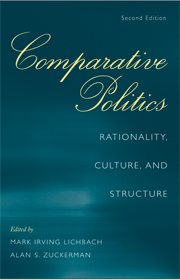Book contents
- Frontmatter
- Contents
- Contributors
- Preface and Acknowledgments
- 1 PARADIGMS AND PRAGMATISM
- 2 THINKING AND WORKING IN THE MIDST OF THINGS
- 3 ADVANCING EXPLANATION IN COMPARATIVE POLITICS
- 4 STRONG THEORY, COMPLEX HISTORY
- 5 RECONSIDERATIONS OF RATIONAL CHOICE IN COMPARATIVE AND HISTORICAL ANALYSIS
- 6 CULTURE IN COMPARATIVE POLITICAL ANALYSIS
- 7 RESEARCHING THE STATE
- 8 AN APPROACH TO COMPARATIVE ANALYSIS OR A SUBFIELD WITHIN A SUBFIELD?
- 9 THE GLOBAL CONTEXT OF COMPARATIVE POLITICS
- 10 COMPARATIVE PERSPECTIVES ON CONTENTIOUS POLITICS
- 11 CITIZENSHIP IN DEMOCRATIC POLITICS
- 12 NESTED CITIZENS
- 13 BACK TO THE FUTURE
- 14 THE COMPARATIVE POLITICAL ECONOMY OF THE WELFARE STATE
- 15 MAKING CAUSAL CLAIMS ABOUT THE EFFECT OF “ETHNICITY”
- References
- Author Index
- Subject Index
- Titles in the series
5 - RECONSIDERATIONS OF RATIONAL CHOICE IN COMPARATIVE AND HISTORICAL ANALYSIS
Published online by Cambridge University Press: 05 June 2012
- Frontmatter
- Contents
- Contributors
- Preface and Acknowledgments
- 1 PARADIGMS AND PRAGMATISM
- 2 THINKING AND WORKING IN THE MIDST OF THINGS
- 3 ADVANCING EXPLANATION IN COMPARATIVE POLITICS
- 4 STRONG THEORY, COMPLEX HISTORY
- 5 RECONSIDERATIONS OF RATIONAL CHOICE IN COMPARATIVE AND HISTORICAL ANALYSIS
- 6 CULTURE IN COMPARATIVE POLITICAL ANALYSIS
- 7 RESEARCHING THE STATE
- 8 AN APPROACH TO COMPARATIVE ANALYSIS OR A SUBFIELD WITHIN A SUBFIELD?
- 9 THE GLOBAL CONTEXT OF COMPARATIVE POLITICS
- 10 COMPARATIVE PERSPECTIVES ON CONTENTIOUS POLITICS
- 11 CITIZENSHIP IN DEMOCRATIC POLITICS
- 12 NESTED CITIZENS
- 13 BACK TO THE FUTURE
- 14 THE COMPARATIVE POLITICAL ECONOMY OF THE WELFARE STATE
- 15 MAKING CAUSAL CLAIMS ABOUT THE EFFECT OF “ETHNICITY”
- References
- Author Index
- Subject Index
- Titles in the series
Summary
Intentional and rational actors generate collective outcomes and aggregate behavior that are often socially suboptimal and personally undesirable. This claim, supported by both logic and evidence, has long been the major contribution of rational choice scholarship. Rational choice has conclusively lain to rest the pluralist myth that individual interest automatically leads to collective action or that collective action necessarily produces a collective good. The guiding insight has a long heritage, dating back at least to Hobbes's Leviathan (1985 [1651]) and to Mandeville's Fable of the Bees (1924 [1714]). However, it rests on an impoverished model of human action and society. Even the great Adam Smith recognized this. Famous for The Wealth of Nations, in which he identifies the conditions under which following personal self-interest makes everyone (or almost everyone) better off, he also authored The Theory of Moral Sentiments, in which he states that values may trump interests.
Comparative and historical rational choice demands theoretically informed empirical investigations of variations in aggregate behavior and collective outcomes derived from models of strategically interacting individuals making reasoned choices subject to constraints. Rational choice analysis derives from but is decidedly not neoclassical economics. It has, at least in the work discussed in this chapter, a richer conception of reasoned choice, interactions, and constraints. Consequently, rationalists now can identify the conditions under which aggregations of rational individuals can produce optimal social outcomes. By recognizing differences in context and institutional arrangements, rationalists can elucidate why the same actors make different choices in different circumstances.
- Type
- Chapter
- Information
- Comparative PoliticsRationality, Culture, and Structure, pp. 117 - 133Publisher: Cambridge University PressPrint publication year: 2009
- 28
- Cited by

